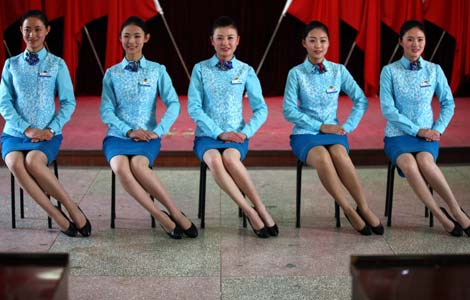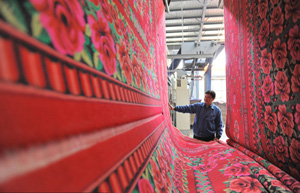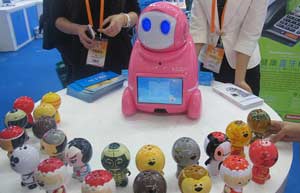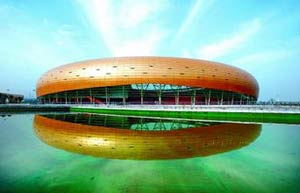London: More Chinese shoppers welcome
By Cecily Liu ( chinadaily.com.cn ) Updated: 2013-09-27 10:30:30
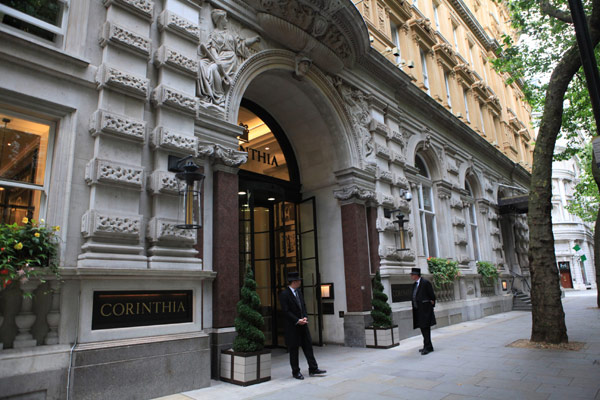 |
|
Corinthia Hotel London, a luxury hotel opened in 2011, popular to Chinese tourists and leisure travelers. [Photo by Cecily Liu/chinadaily.com.cn] |
"London is a welcoming city and an accessible destination for mandarin speakers," says Julie Chappell, Director of Consumer Marketing and Digital Channels at London & Partners.
"We already know that more languages are spoken here than in any other capital city in the world but it is good to hear that so many businesses are investing in Mandarin language services," Chappell says.
At the central London department store Fortnum & Mason, Mandarin speakers are present on each floor. They also help out with the store's special tea tasting sessions.
The luxury shirtmaker Gieves & Hawkes has employed a Mandarin assistant, so that Chinese customers can enjoy the shop's bespoke tailoring services.
One common practice to attract Chinese tourists across all sectors is installing China UnionPay card terminals, which allows Chinese China UnionPay cardholders to spend without paying currency exchange fees.
The Ritz London became the capital's first hotel to introduce China UnionPay card terminals in 2011, and has since experienced 50 percent year on year growth in revenue from the Chinese market.
Founded in 1906, The Ritz London champions consistency of service and in recent years has begun to adapt some practices to suit Chinese customers, says Mark Beverlo, the hotel's international sales manager.
He says The Ritz has also added three Chinese television channels to its rooms, which are China Central Television, Jiangsu Television and Phoenix Television.
Beverlo says The Ritz has also partnered up with selected luxury product brands to provide Chinese customers a good shopping experience.
"There have been measures taken by London-based luxury retailers to accommodate Chinese shoppers by providing Mandarin speaking store staff for consultations.
"We work with these particular brands and promote them to our Chinese guests, informing them when Ritz guests will be visiting their stores in order to ensure their Mandarin speaking staff members will meet our guests at agreed times and provide them with bespoke shopping experiences," he says.
Beverlo says he would like Chinese customers to see their experience at The Ritz as combining history, culture and shopping, which are three key attractive points about London.
"Our building itself is full of history. We can provide our guests very cultural experiences, including having afternoon tea, which is very British. And we help them to secure convenient and enjoyable shopping experiences," he says.
Beverlo says China is now one of The Ritz's top markets, alongside the US, UK, Middle East, Brazil and Russia.
He says that he visits China about four times a year to promote The Ritz together with partner travel agencies in China. He says his team also works with Leading Hotels of the World and has a marketing partnership with The Ritz-Carlton Hotel Company, which operates hotels in several Chinese cities including Shenzhen, Shanghai and Beijing.
Another hotel with a strong focus on the Chinese market is Corinthia Hotel London, located in central London near the British Parliament. "Location is a great advantage of ours. Our travelers can easily access London's business districts in the City or Canary Wharf in the East side of the city, but can also go West for leisure and shopping," says Ivy Jenkins, sales executive for Asia.
The Corinthia hotel group is founded in 1962 as a family business in Malta. Despite the brand's history, Corinthia Hotel London is opened in 2011 hence it is "designed to meet the needs of the 21st century with state of the art technology throughout," Jenkins says. "A lot of our customers from China are young travelers, and sometimes young couples on honeymoon, and they want everything to be perfect," says Jenkins, explaining the hotel's fast broadband, complementary business centre and modern spa are all attractive features for these travelers. She says China is one of Corinthia Hotel London's key growth markets, and the hotel has employed five consultants in China to expand the hotel's publicity. The hotel itself also has seven mandarin and Cantonese speakers working on various aspects including restaurants, spa, room service and concierge. "Our customers from markets like the US and Middle East are well travelled, and know our brand well. However, this is different with Chinese customers, hence we look after them more individually," she says.
"Sometimes they might be a bit shy to speak English, but with our Mandarin speaking colleagues all around, our guests are well looked after, they feel very comfortable with us and eventually speak English fluently with our other English speaking colleagues," she adds. Jenkins says that the hotel takes special care to make sure kettles are set up properly in the rooms for Chinese guests prior to arrival, because Chinese guests need to drink hot water in the morning and tea throughout the day.
Another key change which Chinese tourists impacted on London is the increasing diversity of food offered in Chinatown, says Jeremy Pang, founder of School of Wok, a Chinese cuisine cooking school in London.
As a part of the cooking classes Pang's team provides, he takes his students on a tour of Chinatown, and says he notices its changes as often as every week.
"Chinatown used to be very much focused on Cantonese food, because that is what the Western palate is used to. The lack of diversity meant that restaurants competed on costs only," Pang says.
"But in recent years, a surge of Chinese visitors from different Chinese cities has created a demand for diverse regional cuisine, and diversity has brought an improvement to the quality of the food on offer too," he says.
|
|
|
|
|
|
|
|
European Weekly
 Gear change
Gear change
'Sustainable development', 'decisive role for markets' are the new buzzwords for Chinese economy.



